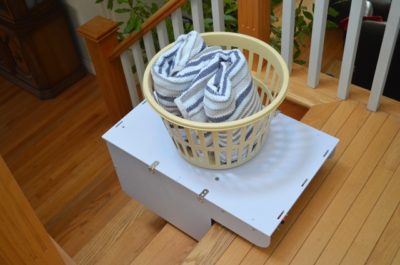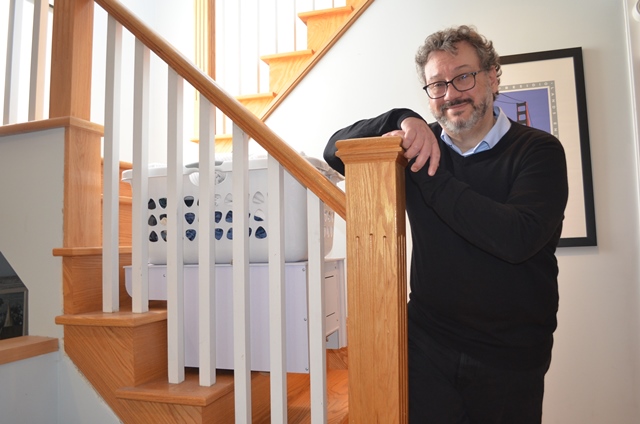How ROSA the robot will help isolated seniors and support aging in place
By Mary Gooderham
Social isolation presents practical challenges for many older adults living at home, especially those who are cut off from the helping hands of others under the recent COVID-19 measures.
Stairs can be a big problem. There’s the strain of carrying everyday items like groceries or laundry baskets up and down even short flights of steps—and the risk of falling. A Toronto startup has developed a service robot that automatically shuttles household items between floors, virtually hands-free.
“We have an automated solution that helps seniors to age in place, and it’s timely given the need for us all to remain physically distant these days,” says Dr. Frank Naccarato, president of Quantum Robotic Systems Inc. (QRS).
Dr. Naccarato, an aerospace engineer who specializes in robotics, was originally inspired to develop the stair-assist technology after his aging parents had trouble managing in their two-story home and had to move to a long-term care facility.
His first effort, called Step-E, has a patented motorized mechanism that allows it to shuttle items up and down stairs, adjusting to each step it encounters while keeping the load level. He next developed a larger version for commercial applications called Doll-E that can handle up to 500 pounds. It does much the same job as the “hand-trucks” used by movers, delivery people and heavy industry but can go up and down stairs under its own power, saving time and labour.
There’s lots of interest in Doll-E in the moving business, Dr. Naccarato says, however that industry has been hampered by COVID-19 regulations and economic difficulties. With the pandemic making it necessary for seniors to shelter in place, he pivoted to refining the technology for the home.

Enter the Robotic Stair-climbing Assistant, or ROSA, a compact cart that carries items up to 100 pounds on stairs. Dr. Naccarato developed ROSA in collaboration with George Brown College’s School of Mechanical Engineering Technologies, assisted by Strategic Investment Program (SIP) Accelerator funding from AGE-WELL, Canada’s Technology and Aging Network.
Dr. Naccarato says ROSA could not have become a reality without a team of faculty and students at George Brown, led by Professor James McIntyre, which perfected it under the COVID-19 lockdown conditions. Dr. Naccarato delivered parts to students’ homes so they could continue their research. “It was challenging, but we did it,” he says.
AGE-WELL’s support “has been invaluable,” Dr. Naccarato says, helping finance the development of ROSA while suggesting other funding, marketing and promotional opportunities. At an AGE-WELL workshop, he presented ROSA to a group of older adults and caregivers who provided valuable feedback on issues such as types of control mechanisms suitable for older adults.
His goal is to make ROSA ultra-easy to use. He envisions it as a “discrete appliance”, about the size of a piece of carry-on luggage, tucked away on its own charging station when not in use, much like the storage of those “robot” vacuums becoming ubiquitous today.
Existing solutions for steps such as stair-lifts can be extremely expensive, he says, and they aren’t meant to carry objects.
By autumn, Dr. Naccarato plans to conduct tests in people’s homes with a ROSA that has climb-and-wait capability, controlled wirelessly. The device could be on the market soon after. Future versions will be voice controlled. They will be able to transport objects from room to room, and to work outdoors, for example from the driveway to the porch.
The technology could also be used for “touchless” curb-to-door deliveries by companies like Amazon, he says, or to shuttle items to people who are sick or recovering from illness, say on different floors within the house.
ROSA is also “expandable” and could be fitted with a camera to become a “telepresence” platform to check on people in isolation, says Dr. Naccarato.
He has also designed a prototype stair-climbing wheelchair, called the Wheel-E. It’s a portable alternative to fixed ramps and installed stair-lifts, explains Dr. Naccarato, who is driven by a strong desire to solve problems.
“Problem-solvers are motivated by that rare feeling of seeing their solution—which previously existed only in their imagination—become something genuinely useful in the real world,” he says. “If I not only solve the problem but also do it in a creative and original way, it’s all the more gratifying.”
Mary Gooderham is an Ottawa-based freelance writer. AGE-WELL is a federally-funded Network of Centres of Excellence. The pan-Canadian network brings together researchers, older adults,




